DEPUTY UNDER SECRETARY OF COMMERCE FOR INTELLECTUAL PROPERTY AND DEPUTY DIRECTOR OF THE UNITED STATES PATENT AND TRADEMARK OFFICE (USPTO), DERRICK BRENT, SHARES HIS JOURNEY AND INSIGHTS INTO THE IMPORTANCE OF THE PARTICIPATION OF MINORITIES IN INNOVATION AND IP.
Editor:
Thank you for taking the time to meet with us Deputy Brent. Before we dive into work, your team shared that you are an avid music aficionado. Can you tell us a bit about that?
Deputy Director Brent:
Well, first, thank you, it’s a pleasure to meet you and your team. I think about interviews as being more of conversations, so I’m looking forward to a good conversation today. Music! Since being a kid, my family has been into music and it’s funny, but no one was a formally trained musician until I came along. Mom always enjoyed music and once got chased out of a bar when she was 16 years old trying to have a drink with George Benson, who was only 17 years old, at the time. She also got to have a drink with The Temptations after one of their shows in Pittsburgh. But she’s always been a music fan. My dad was a singer when he was in the military.
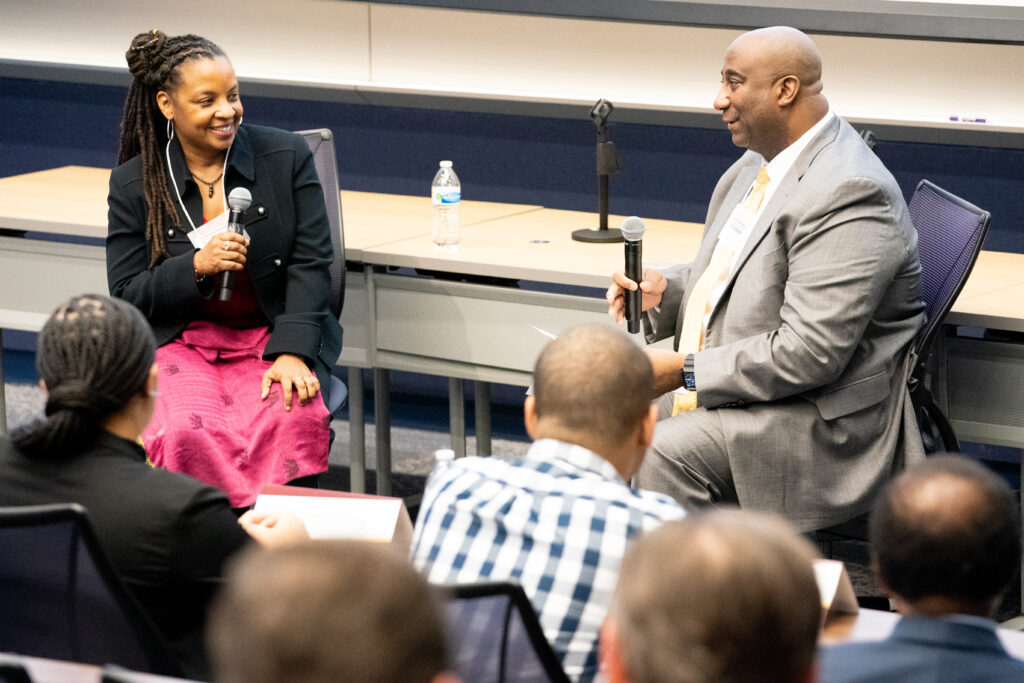
I grew up with music from Motown to classical because I started out on clarinet, picked up a trumpet a couple of years later, and then eventually through high school, learned to play all of the band instruments, with the exception of bassoon, oboe and drums, and then also wrote music for everything from a complete symphony orchestra down to jazz combos.
I’ve been a long-time fan of music. The stories behind it, I think, is what grabs me the most. It’s the stories of the musicians, the stories of what inspired them to write their song. Then ultimately, the way the song makes you feel, what does it capture in terms of an emotion? In the movie I’m Gonna Git You Sucka, they said every hero has a soundtrack. I always think of music as being the soundtracks of our lives. Sounds take us back to moments so I’m a big advocate, big fan of music, and a broad array of musical tastes from across board.
Editor:
You mentioned that you played several musical instruments and wrote music. How do you think that experience impacted your journey in school and in your career?
Deputy Director Brent:
It’s interesting. A couple of ways – The first way is music is a microcosm of part of me in that I’m a bit of a polymath in that I take in a wide range of experiences. I love to experience a bunch of different things. Then I like to bring those different experiences to help solve problems, specific problems, because I think bringing in a variety of perspectives helps you to get the most robust or comprehensive solution.
I think the other way that my musical experience shows in my writing and probably even in my speaking.
When I got to law school, one of the things that I remember my first year legal writing instructor mentioning, he said, “Derek, you write beautifully but you write in prose and in the law we write in a much more organized, structured fashion. By the end of that class, as we worked together and I learned how to organize legal arguments, he said, “Never lose what you have. There’s a lyrical quality to the way you write things, and it evokes feelings along with the actual arguments that you’re making.” I’ve held on to that quality, and I credit the judge for whom I clerked, I think I got very lucky in this, Judge Algenon L. Marbley in the Southern district of Ohio (he’s currently the Chief Judge of the Southern district of Ohio). He, too, grew up with music and is a big music fan. We were a match. I was one of his first clerks and when we were working on opinions for him, there was something about it where it was logical, but it had to have a resonance in terms of how it made you feel. I think I still write lyrically, but with legal organization.
Editor:
Part of your career is as an engineer for GM. How did that transition happen and how did you land up now in this IP space?
Deputy Director Brent:
It’s interesting. Working at GM was a transition in engineering, and it was a really good transition to me from undergrad. I was blessed because engineering can feel a bit theoretical until you actually go out into the real world and see how engineering is applied every day. I got this internship in my sophomore year and all of a sudden I got to see how engineering was actually applied in a lab, in a lab that tested things for the car industry. I think it helped me out in the real world to have that experience.
For background, I managed five subcontracted plants for General Motors at the age of 23, and that’s a whole story unto itself, being a 23-year-old kid talking to a 50 and 60-year-old plant manager saying, You have to do X, you have to do Y. But that experience didn’t necessarily lead me straight to IP. Funny enough, I was exposed to IP in law school, and it was because the firms that were looking at me were looking at me primarily for IP. It was not something I thought about practicing. I knew that there were patents, trademarks, and copyrights. Interestingly enough, I actually have a copyright for a song I wrote when I was 16 or 17 years old.
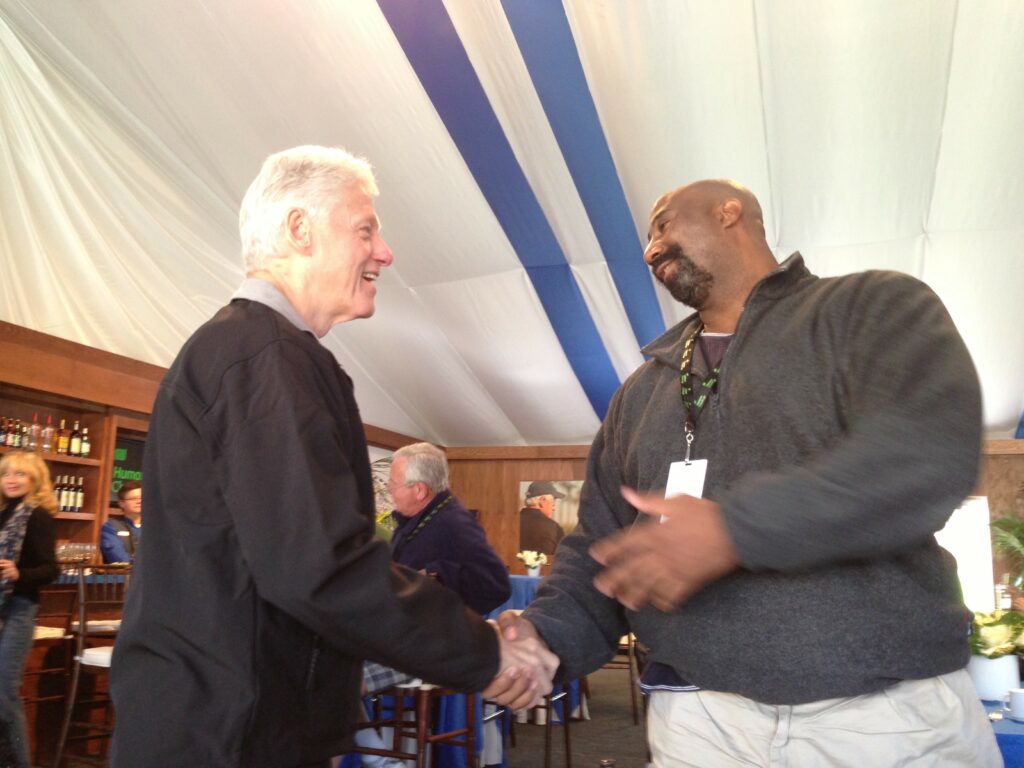
I knew what intellectual property was, but I didn’t know about practicing in that area of law until I was approached by different law firms. I worked at a boutique law firm for my first summer and I was like, this is awesome. IP was this very rare world where I could apply my creativity and my analytical side. Then the cherry on top was the fact that I had worked in this area of engineering where I’d worked on production lines and I’d seen how parts, pieces or parts are put together in different things.
That blended in with my experience and just gradually made me enjoy intellectual property and to feel at home practicing in that area. Now, as you know, I did IP for a while and then I switched over and did some civil rights law, then I got to combine both when I went back to the Senate and I got to do more IP policy as well as getting to do some civil rights and judicial nominations.
Editor:
What you’re saying really makes me think about the misconceptions and myths around intellectual property rights. What should people be aware of when thinking about the whole ecosystem?
Deputy Director Brent:
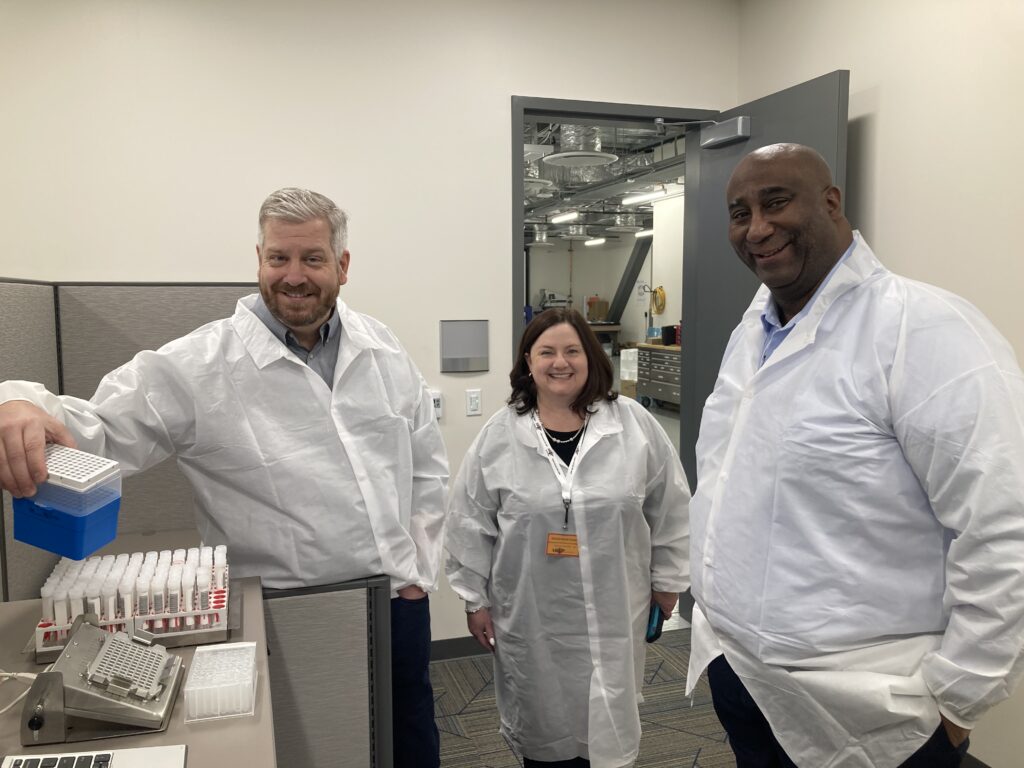
That’s a great question, there are a few misconceptions out there. Towards the top of that list, is that intellectual property only means tangible things, or intellectual property only applies to inventions. Inventions like are you inventing a car? Are you inventing a computer? Are you inventing something, a medical device? That’s not the case. I think, especially when talking to minority communities or underrepresented and under-resourced communities, one of the things that not only do I stress, but the director, Vidal, stressed is that there’s more to intellectual property.
There’s the copyright. You might have a recipe, you might have a computer code and that can be protected with a copyright. You might have a brand that you use for your business. It’s the name of your barber shop, the name of your corner store, the name of your home goods business. These things are trademark. They’re brands. The trademark is the very first way as an entrepreneur that you’re going to touch your consumer. It is the thing that the consumer is going to attach to you and your product. A trademark is very, very important because that’s what you’re going to lead the consumer with.
Another misconception is that IP is only for big businesses and that’s not the case. A trademark can be obtained on a good or service. That’s important because a lot of people will ask “can I just trademark my name or my nickname? Well, not in and of itself. It has to be used in commerce, whether it’s a service or a good or something along those lines. But the more equally important to clarify is the knowledge that IP does not apply to me. It does apply to you and as you think through it, what do I need? Do I need my brand? Is the brand for my business protected? Am I contributing to an invention? Sometimes you’re working at a place and you’re part of a team that’s inventing something. Should you be listed as an inventor? These are all types of knowledge that we’re trying to get out to the public so that folks are more aware that IP is more than just something that big companies do.
It is something that we all do in some way, shape, or form. It’s an important part of our life and especially an important part of our commercial life. One of the tools that we have is called IP Identifier, and this tool allows individual businesses to answer questions related to their businesses. The tool then shows which are the most likely parts of IP that you can use to protect your work. That’s just one of the resources that we have out there along with our pro bono clinics, of course.
Editor:
Talking about the pro bono program, tell us what are the goals of that program and what are some key successes that you could share with us?
Deputy Director Brent:
I think one of the biggest goals of it is to provide services where they’re needed and to expand that a little bit, applying free services or offering free services where they’re needed. When you provide these services where they’re needed and you provide opportunity to those who haven’t traditionally had an opportunity, what you end up getting is a very robust innovation pipeline. You get new people into the system and it might be their first time or maybe they’ve had a few failures and they’re getting in, but somewhere along the line they’re going to succeed. There’s an income threshold that you need in order to have the services available to you and there’s a requirement of knowledge either that you have a provisional on file or I believe you can take a certification class through the USPTO to certify that you are knowledgeable about patents. Right now, our pro-bono is on the patent side primarily, except for law school clinics, which offer trademark work as well as patents. But you have to have a certain knowledge component.
If you can meet at least those two requirements and demonstrate that you actually have something that is inventive, then we can get you free legal services. We have people who volunteer and about 20-21 pro bono clinics across the country. They cover all 50 states, the District of Columbia and Puerto Rico. We’re very proud of the service that has been administered but I think one of the biggest pieces of evidence about the success of the program is what the pipeline looks like in the pro bono world. The pro bono program is something I think everyone at this agency is hugely proud of. When you look at the pipeline, we don’t require the reporting of demographic information, but our pro bono partners have shared with us the demographic data that they have. It looks something like this: 43% of the people using our service identify as women. Now, in a traditional pipeline, women account for roughly 13% is our estimate. You’re talking about tripling that number just by putting the services where they’re needed.
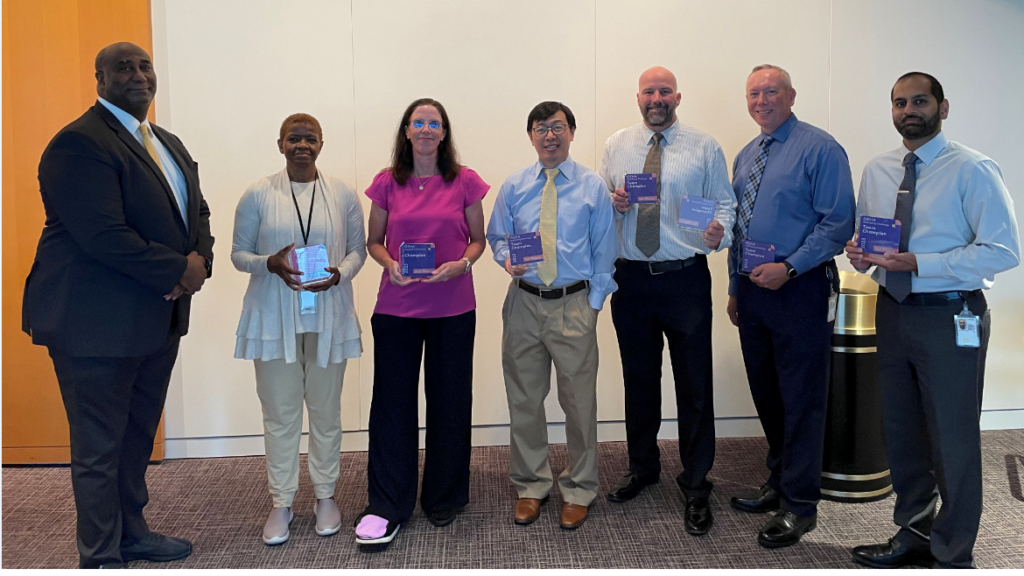
If you provide the opportunity, people will take advantage of the opportunity, and you get a bold new world. Likewise, African-Americans make up about 13%, 12-14% of the population. African-Americans in our pro bono program account for 35%. You go down the line, 14% Latino-Hispanic, 8% veterans, and I believe 6% Asian-American or N-H-P-I. What you see there is a robust pipeline, inclusive innovation, which is one of the hallmarks of what we believe the agency’s mission is, to bring everybody on board.
“Innovation is not just for some, it’s for everyone. The more people that we get in the innovation system, the more innovation we get. That benefits everywhere from communities, it benefits consumers, and it benefits our country, and it strengthens our economy.”
Editor:
I’m so glad to hear that those numbers are rising. I think looking at the comparatives and other ethnic groups is really important for us. With so many advancements in technology, how does intellectual property law deal with emerging technologies like artificial intelligence, blockchain, 3D printing?
Deputy Director Brent:
You can’t have a conversation these days without mentioning AI. I can remember (aging myself here) but I can remember when AI referred to Alan Iverson in the NBA. But there’s more emerging technology. There’s blockchain that we saw, the internet just 20 -25 years ago was nascent. The way that the USPTO handles it, and again, another success that I credit to Director Vidal and her leadership, is that we have made it a more robust effort that where there are emerging technologies, AI, blockchain, NFTs, climate technology, thinking about cancer, Cancer Moonshot that the White House has promoted, we have also tried to support it with our own efforts over here with our examination process, with expedited examination.
But when you look at areas of emerging technologies, the key is to make sure that you’re engaging with the public. By engaging with the public, one side of that is talking to the people in industries where there are emerging technologies, engaging with them, talking to them, learning what they’re doing.
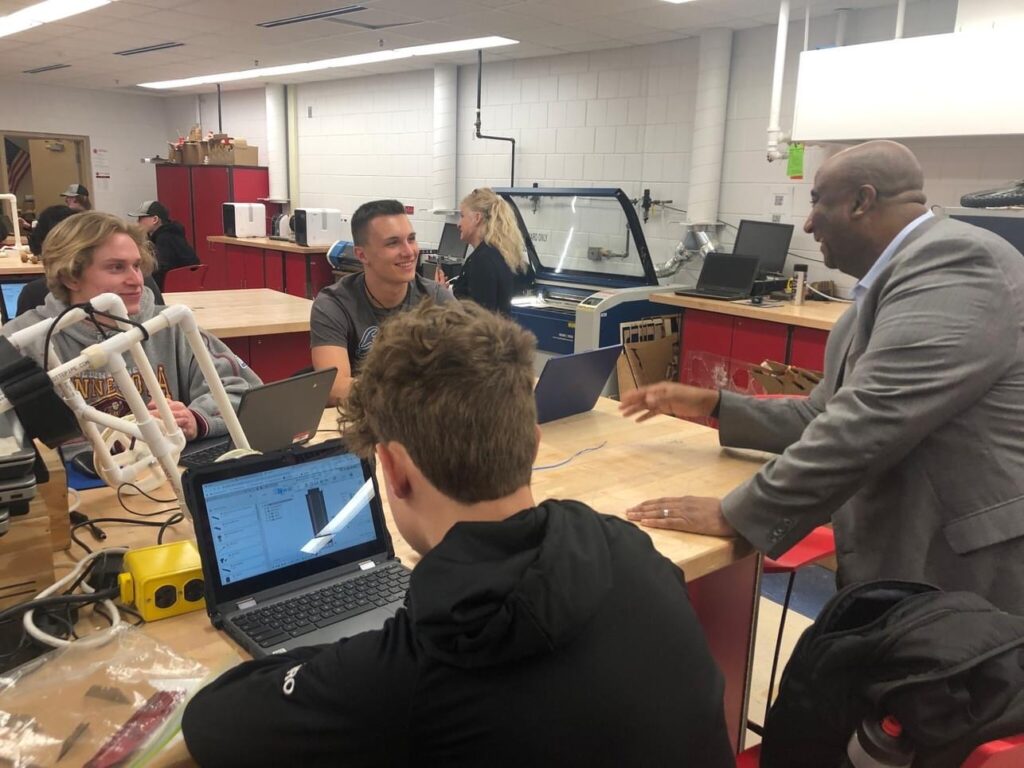
We have a fulsome and very robust conversation with industry. That includes, in some cases, bringing industry in to actually meet with our examiner. Our examiners get a first-hand look at the technology. They’re not just always dealing with paper. They’re getting a chance to look at, actually meet people and to talk to, whether it’s industry folks or particular inventors, to learn more about their technologies. That informs their examination process and it’s not just a set of drawings on a piece of paper or a bunch of words, it’s something that they have a concept of in terms of how it works and so forth.
By that same token, industry learns when we have that engagement because they learn about the examination process, and that’s equally important. Our examiners are examining both in trademarks and in patents, but primarily in terms of technology, we’re talking about patents. These are top notch, incredibly smart people, some with doctoral degrees and extremely knowledgeable in their areas. They’re subject matter experts.
Then we have to engage the public and make sure the public is educated and they’re learning what we’re learning. There’s also outreach that we do. Anytime that we have any policy that we put together around an emerging technology, any type of program that we put in place for an emerging technology program, we make sure that we engage the public so the public knows and we provide room for the public comment to inform our policy decisions. I tell people all the time, please believe that we read those comments. It is important to us. No matter how small or how large your thought is, please engage when you see a chance to comment. Only through dialogue can we reach understanding. I think one of the great things Director Vidal has done with her leadership and hopefully myself in supporting her leadership is that we try to create robust dialogues that create better understanding all around and hopefully better policy outcomes.
Editor:
That intentional listening is noteworthy. How do people protect themselves with emerging technologies? While you’re crafting policy, are we on track to meet what’s coming out?
Deputy Director Brent:
I’m going to reframe that a bit. There’s an element of “how do you protect?”, but there’s also an element of “how do you engage with it?” If we think about minority communities, if the innovation economy is taking off, how do we link up with that?
“…if we don’t catch up with the innovation economy and if we aren’t on board as soon as possible, at least understanding and working with AI, we risk not being able to participate in the economic benefits of innovation.”
We can’t have that happen. That starts in our children. We do outreach, we have programs, we have a National Summers Teachers Institute. That’s where we teach the teachers so the teachers can get the youth involved and understand intellectual property and emerging technologies. That the kids can understand like, ‘Hey, here’s this cool technology, but here’s the intellectual property behind it.’ You also have to educate at the high school level and at the college level.
We need more researchers. HBCUs produce a huge amount of STEM graduates. We need those STEM graduates to figure out how to get more involved, how to link them up with entrepreneurship. We think about How to expand research opportunities at HBCUs such that we create more startups, more commercial activity and startups coming out of HBCUs. There are some wonderful private sector individuals who are working to create more marketplace opportunities. I would highly recommend if you ever get a chance to talk to Marlon Evans, he is doing some outstanding work. He has a fund that he has created that is designed to support HBCU students, faculty, and graduates as they develop startups. We have to actually figure out a way with the HBCUs to expand the research and expand the commercialization opportunities, including putting that intellectual property down so that individuals are protected when they get to the marketplace.
Back to your original question there’s an engagement that we have to have with the various emerging technologies. But how do you protect it? Perhaps consider this – policymakers and governments wrestled with the internet, and they saw that they were a little bit behind on that. Now you hear a very, very early conversation on AI. I shouldn’t say very early because all of the people inside the industry would say, this has been around for years. But you’re seeing at a government level, you’re seeing policymakers and subject matter experts start to engage and ask questions early. I think that’s good. I think we’ve taken a lesson that it’s better to ask the questions early and make sure that we’re developing technology that is also safe for the consumer market. There’s good work being done in that area with good questions being asked. The industry is also trying to come to the table and say, let’s work with you. That’s not something that you saw, I think, in the 2000s with the internet battles. This time you see there’s a little bit more engagement because everybody is at least in spirit trying to sing out of the same hymn book.
Editor:
It’s good to hear that the AI conversation is happening sooner. I also remember seeing information about ubiquitous living, and now we’re seeing it become more accessible to the consumer instead of just in concept. M
In terms of minority groups and the underrepresented would you say that knowledge and resources are what hinder their progress in terms of trademarking and IP? What have you seen in the field and how as a community can we try to address those?
Deputy Director Brent:
I’ll answer this in two parts, and I’m going to keep trying to betray my legal training and give something that approximates briefer answers.
On the IP side, there’s awareness for the community. Awareness is the big thing. Keep driving awareness. For example, recently we were able to participate in a National Black Business Conference with the National Business League, and had a chance to talk to entrepreneurs about the available resources, the USPTO, and to talk about why IP is important to innovation. Some people are blown away with the stats, but one If you could increase intellectual property by a certain amount, it’s exponential as to how many trillion it would add into the GDP.
There’s another statistic that talks about black entrepreneurs. In fact, black entrepreneurs roughly are about 2% of funded businesses but if you were able to get black representation just up to its level of representation in society, and that’s irrespective of performance, you would add about a trillion dollars, and that’s per McKinsey report, you would add a trillion dollars or not, I’m sorry, a billion dollars into the GDP, and that’s a sizeable amount.
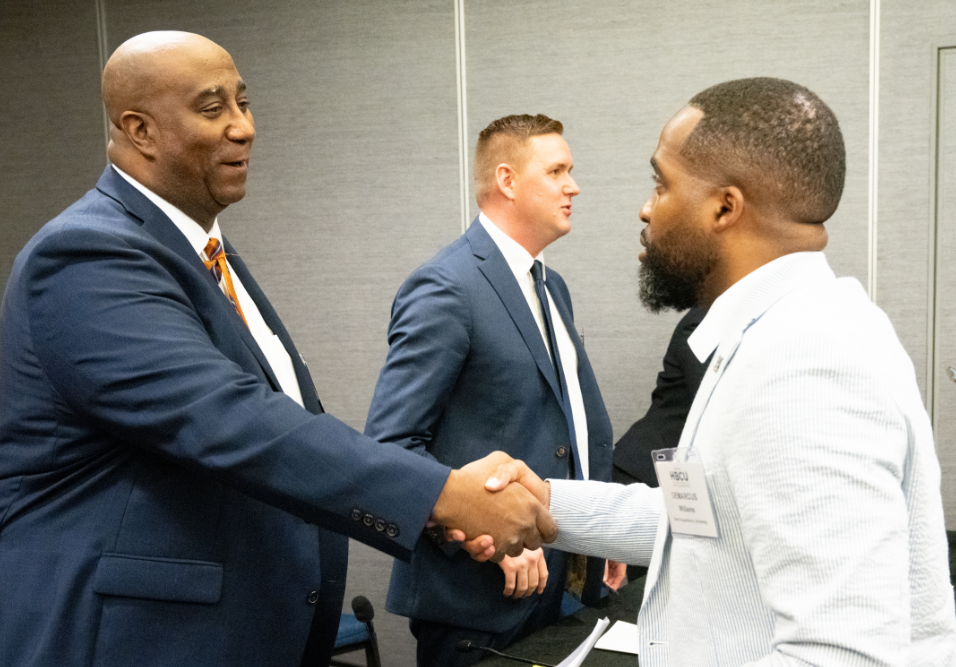
We have to create awareness as early as possible that you are an entrepreneur. Even if you’re going to go into a corporate job, you are an entrepreneur of your career. Understanding intellectual property and understanding the entrepreneurial spirit is important. I was fortunate enough recently to be part of a roundtable with black entrepreneurs. It was one of those sessions that I didn’t want to end. They were basically dragging me away from the table. Here’s what the entrepreneurs said – there was access and visibility. They don’t have visibility of each other, and that’s a problem. They always feel like they’re alone, and if you don’t have a connection to the government, to any type of government resources, maybe someone has a connection to the SBA, but another person is doing some research and they’re connected to DoD.
As an entrepreneur, that could be overwhelming. They don’t have that visibility to connect the dots. That’s one of the things we’re working on. Myself and many colleagues, as I’ve talked to them about entrepreneurs, particularly underrepresented entrepreneurs, agree that the federal government has to do a better job of connecting the dots so that the consumers, in this case, the entrepreneurs, can have better visibility of a wide array of resources so that they can pick and choose what will work for them and help them to advance. I think out of that roundtable of visibility, community, network, mentoring, minority/black entrepreneurs, when they succeed, they should look for an opportunity to pay forward their blessings. You have a ready-made community of people ready to pay back their blessings and to mentor others and to help others open the door for others.
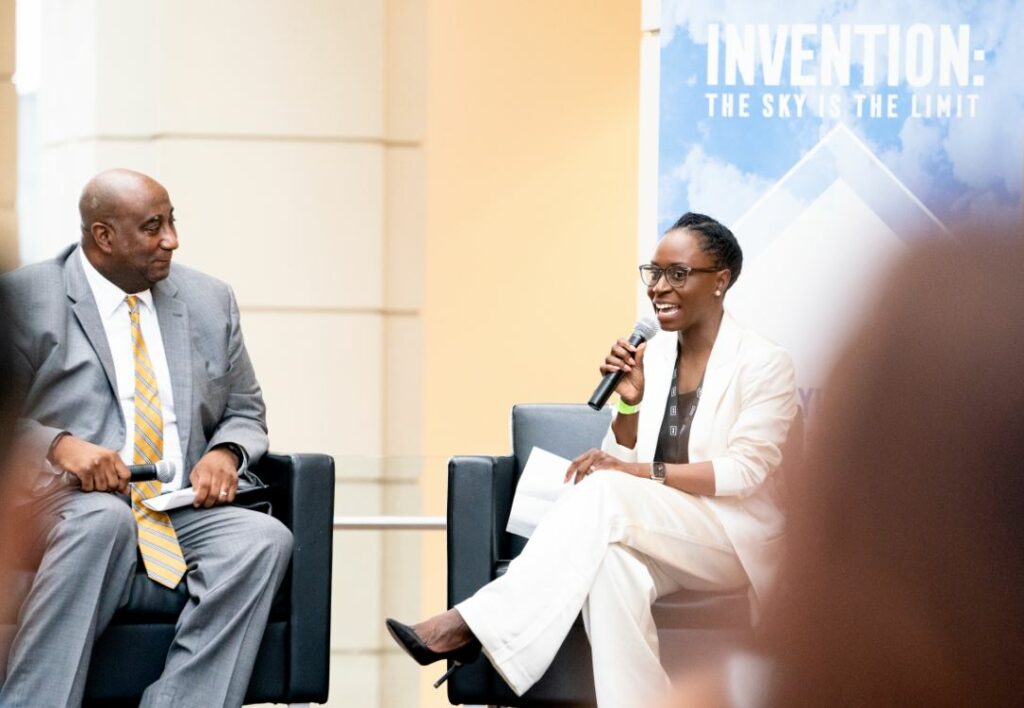
Combining what the community needs with what the community has is a great opportunity. If we and the federal government can also corral our resources so that they’re more accessible, that’s a winning combination. Again, we have to reach them younger so that individuals have their entrepreneurial mindset all the way through. Then I think as you get farther out, you have to provide coordinated resources, make them available and readily accessible. I think that’s the way we can get minority entrepreneurship up, gain traction and see success and develop a better connection to the economies that are currently humming along.
Editor:
That definitely looks at the various aspects for access to resources as well as community involvement. In a high pressure and demanding role such as yours, how do you find work-life balance? Do you have any hobbies?
Deputy Director Brent:
How do I find balance? I’ll tell you one thing. When I’m in government service, I’m very much almost an all-in person. I derive pleasure by serving both the public and serving my fellow colleagues.
But that said, I’m an avid golfer although I don’t get to play as much as I want to. I’m a big, big sports fan. In high school, I played football, basketball, wrestling, golf, and tennis. The wrestling was not successful. Anybody from Western Pennsylvania would tell you that they looked forward to seeing me show up as their opponent because the 5’9 and 180-pound kid was easy work. But I enjoy a lot of sports and I follow them.
Obviously, I’m a huge music fan. I probably don’t keep up as much with current music as I should. I taught a class at Georgia Southern American Government and my students used to crack up because I was learning new music because there are extra credit questions for any quiz or any midterm, which involved challenging them to pick one artist over the other and tell me why. I would often have three to five questions like that for extra credit. They enjoyed that. I learned about new music.
Editor: Favorite place to travel?
Deputy Director Brent: Toronto, Canada is one of my favorite cities in the world. But I freely admit, I’ve not been to Europe or other places, Asia. I spend some time in Jamaica also because I have my in-laws. But Toronto is one of my favorite cities.
ABOUT DEPUTY DIRECTOR DERRICK BRENT
Derrick Brent is the Deputy Under Secretary of Commerce for Intellectual Property and Deputy Director of the United States Patent and Trademark Office (USPTO).
Deputy Director Brent has served in all three branches of the federal government: executive, legislative, and judicial. In addition to his work as a Chief Counsel in the U.S. Senate, he clerked for the Hon. Algenon L. Marbley, Chief Judge of the U.S. District Court for the Southern District of Ohio. After litigating at the law firm of Vorys, Sater, Seymour and Pease LLP in Ohio, he served six years as a Senior Trial Attorney at the U.S. Department of Justice, Civil Rights Division, where he received a Special Achievement Award for his trial work.
Deputy Director Brent has been actively involved in academic and nonprofit work, teaching an American government class in the Department of Political Studies and International Studies at Georgia Southern University and playing leadership roles in the African American Chefs Hall of Fame and in Pooler Paws, an organization helping the feral cat community in Pooler, Georgia, and surrounding communities.
Deputy Director Brent received a Bachelor of Science degree in mechanical engineering from The Ohio State University and a Juris Doctor degree from the Northwestern University School of Law (now the Northwestern University Pritzker School of Law).

